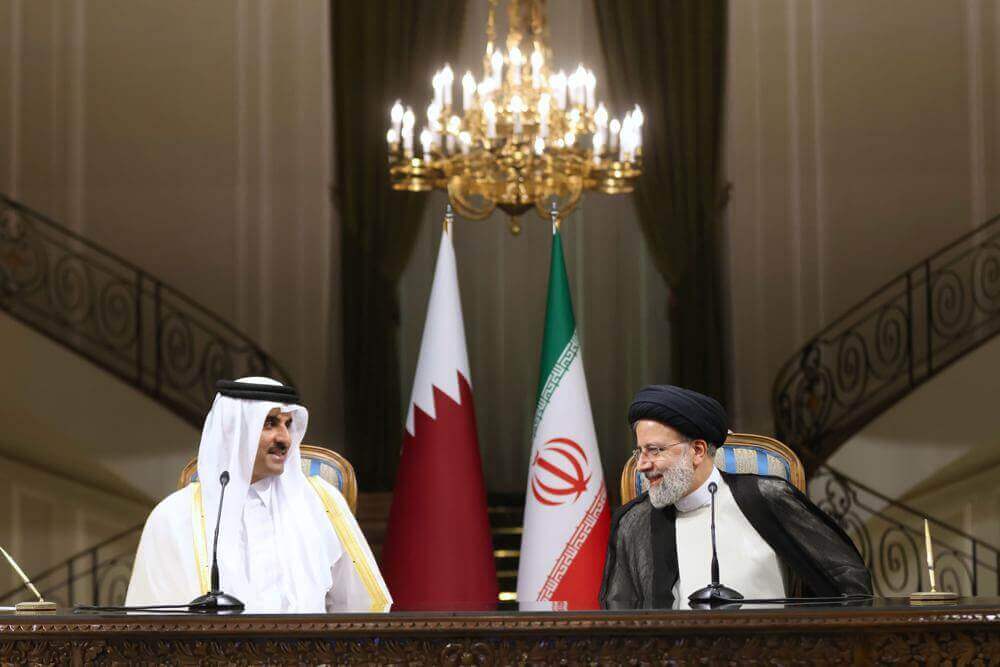Qatari Emir Sheikh Tamim bin Hamad Al Thani met with Iranian President Ebrahim Raisi in Tehran on Wednesday to help revive stalled nuclear talks between Iran and world powers to restore the 2015 nuclear deal, also known as the Joint Comprehensive Plan of Action (JCPOA).
The Emir also met with Supreme Leader Ayatollah Ali Khamenei in Tehran. Khamenei called on both sides to expand economic and political ties, as “the solidity and stability of Iran-Qatar relations benefit both countries.”
Sheikh Tamim bin Hamad Al Thani, the Emir of Qatar, and his entourage met with Imam Khamenei, the Leader of the Islamic Revolution pic.twitter.com/uGpPESH5Zc
— Khamenei.ir (@khamenei_ir) May 12, 2022
Al Thani told reporters that there is no other solution other than negotiations for reviving talks. He added that “resolving disputes in the region cannot happen without dialogue” and expressed Qatar’s willingness to help restart the talks.
“We have always had a positive view of the Vienna talks because we believe that talks are the solution to this issue,” Al Thani said.
A source told Reuters that with the trip Al Thani aimed to bring Iran and world powers to an agreement regarding restarting the Vienna talks. He told the agency that planned on establishing a “new middle ground” between parties to the JCPOA.
Iranian state-owned news agency IRNA quoted Qatari Foreign Minister Mohammed bin Abdulrahman bin Jassim Al Thani, who was also part of the Emir’s delegation to Iran, as saying that the nuclear talks in Vienna are at a “crucial stage” and Doha is keen on supporting both sides reach a deal.
“We support reaching a deal which is fair for all parties because it would have a positive implication for the region,” he said, adding that “the central element is the regional dialogue and the nuclear deal is a supporting element to help establish stability in the region.”
#BREAKING: #Qatar's emir is meeting with #Iran's supreme leader. This is the most important meeting he will have in Tehran--probably the most significant one of the week and that's with Mora in town. The last meeting Khamenei had with the Qatari emir was in January 2020. pic.twitter.com/0S7wk3mn6q
— Jason Brodsky (@JasonMBrodsky) May 12, 2022
Ongoing talks in Vienna to revive the JCPOA have continued for over a year with little progress to show. Iran has called on the US to remove all sanctions, including non-nuclear ones, as a precondition for it to resume full compliance with the 2015 nuclear deal. However, Washington has been unwilling to accede to Tehran’s demands, accusing it of not taking enough steps to curtail its nuclear programme.
A key point of contention is regarding the US’ designation of Iran’s Islamic Revolutionary Guards Corps (IRGC) as a foreign terrorist organisation (FTO). Iran has stated that any deal is contingent upon the US delisting the IRGC as a terrorist group. However, the US has so far been reluctant to remove the Guards from the terror list, given that its allies in the Middle East—Israel and Gulf countries—have expressed serious concerns about such a move.
Also Read: Removing the IRGC From the Terror List Would be a Colossal Blunder by the US
As a result, the Vienna talks have been stalled for over a month, with many reports stating that negotiations are on the verge of collapse. Against this backdrop, Qatar has emerged as a crucial mediator, as it shares good ties with both Washington and Tehran and has recently set aside differences with its neighbours in the Arabian Gulf.
While Qatar shares “strategic” ties with the US, it also maintains cordial relations with Iran, something that led to the 2017 boycott of Doha by other Gulf Cooperation Council (GCC) countries, including Saudi Arabia, the United Arab Emirates, and Bahrain. Qatar normalised relations with the GCC last year but stressed that reconciliation will not affect ties with Iran.
Al Thani and Raisi also discussed the situation in Palestine and the Yemeni civil war. Raisi stressed that Iran seeks the liberation of Palestine and Al Quds (Jerusalem) from the “Zionist Regime [Israel]” and condemned Israel for murdering Al Jazeera journalist Shireen Abu Akleh. “We emphasise that the perpetrators of this crime should be punished and the world should not treat this with double standards,” Al Thani stressed.
After the summit, Iran’s FM @Amirabdolahian offered his country’s official condolences to Qatar and Aljazeera network, presenting a drawing of Shireen Abu Akle, Aljazeera’s correspondent in Palestine who was assassinated by Israeli occupation forces. pic.twitter.com/c3WFsIu5MK
— Ali Hashem علي هاشم (@alihashem_tv) May 12, 2022
The pair also agreed to work jointly to bring the conflict in Yemen between the Houthi rebels and the Saudi-backed coalition.
Raisi concluded by saying, “Without a doubt, the visit of the Emir of Qatar to the Islamic Republic of Iran is a turning point in promoting relations between the two countries and the two nations.”

